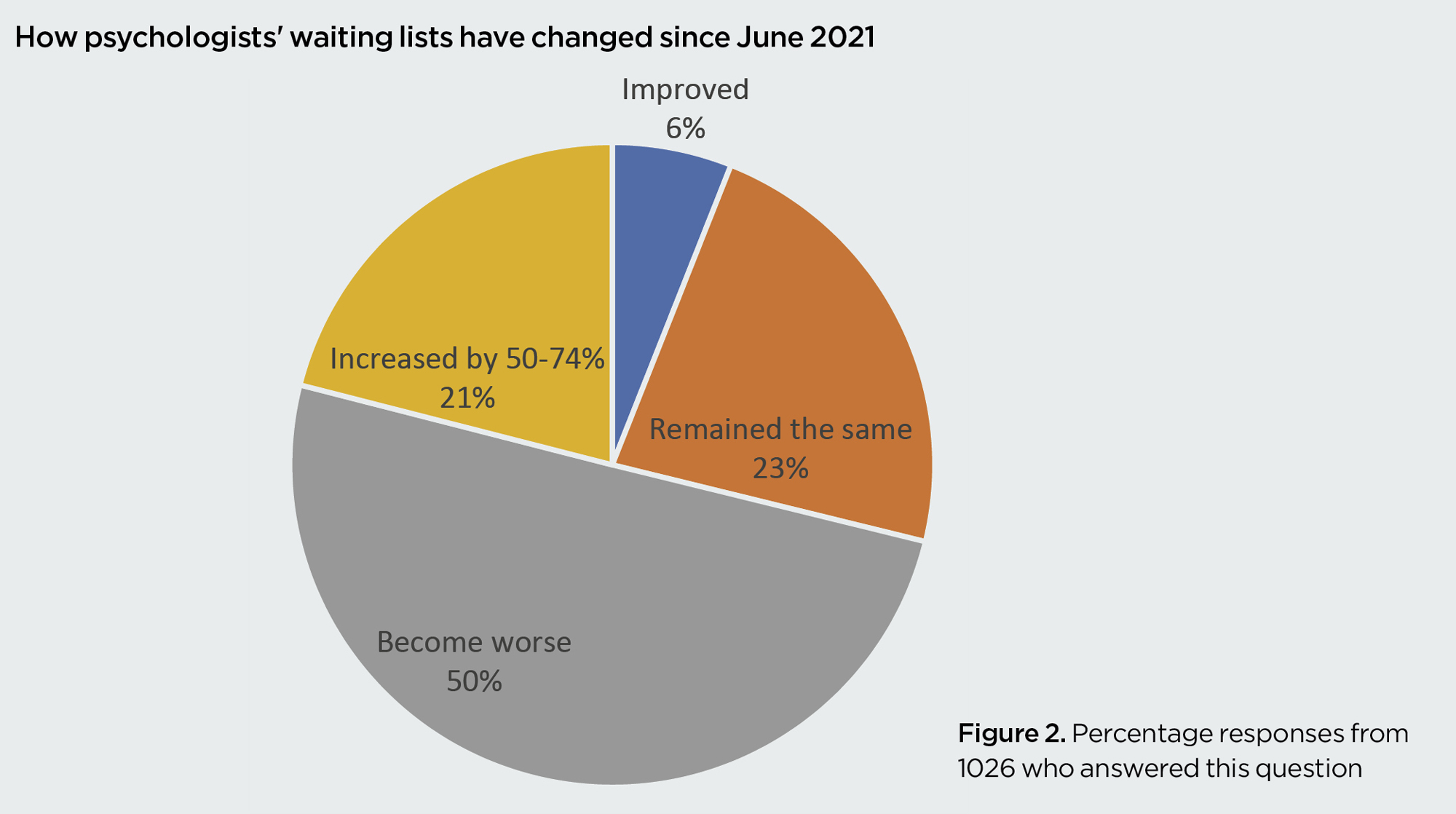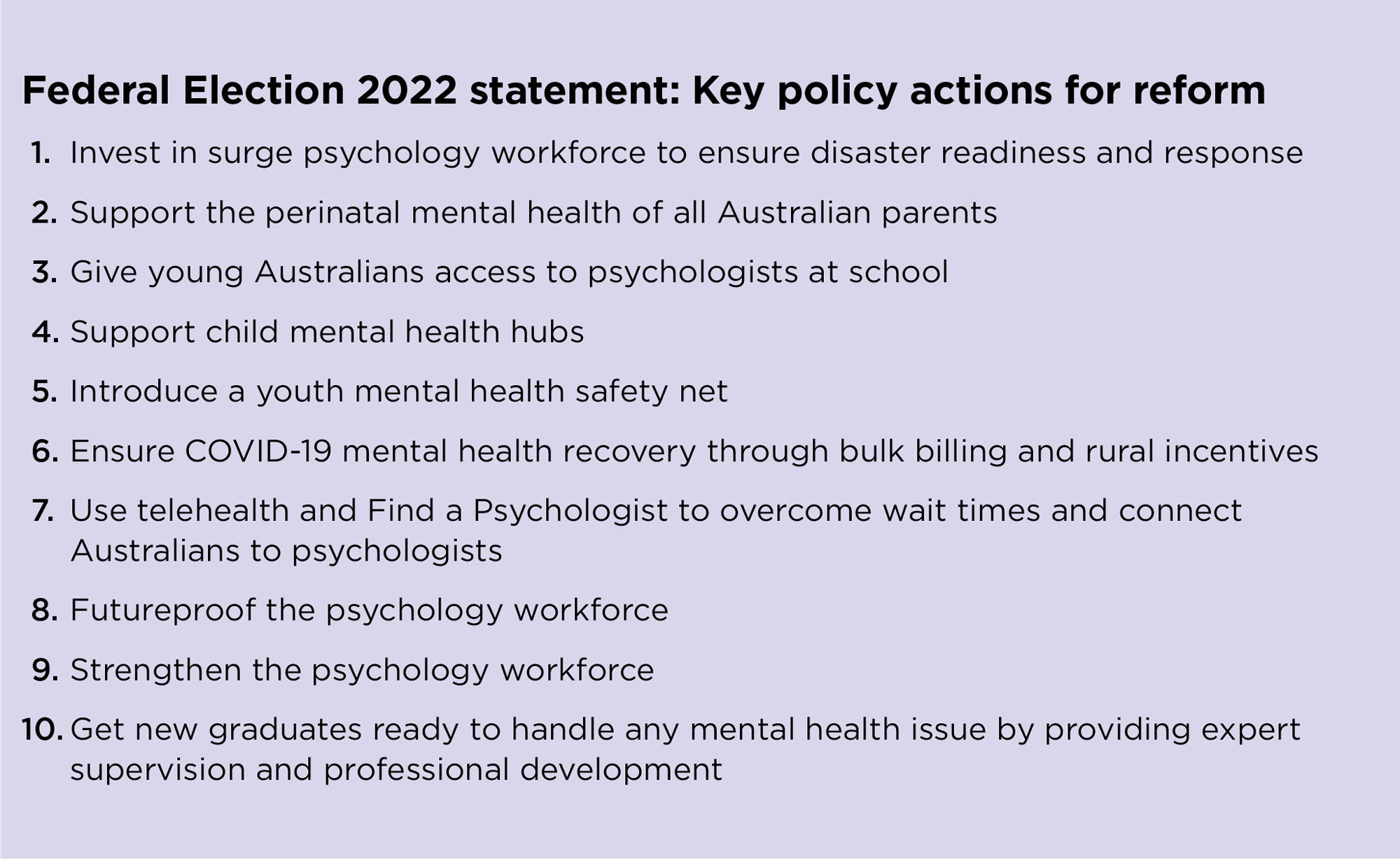Building a case for change
Understanding how the COVID-19 pandemic has impacted Australians and psychologists gives us the grounding to drive our efforts to improve mental health and wellbeing outcomes. The APS has checked in with members many times over the past two years – including through surveys, webinars and forums. In February 2022, we asked psychologists how they and their clients were faring, and what needs to be done to reverse the tide of the mental health crisis sweeping Australia.
We knew psychologists were struggling to meet demand and suspected the situation was getting worse. The picture painted by the 1456 members who responded to our survey is stark. The pandemic is having severe consequences for mental health services across Australia, with a record number of psychologists now unable to see clients. Psychologists are burnt out and working long hours, and job satisfaction is taking a hit.
Demand, unbillable hours and wait times
Here are some findings from the survey, broken down by impact on our profession and clients.
Psychologists are working more unpaid hours than GPs
- Psychologists in private practice are working on average 17 unpaid (unbillable) hours each week
- These unpaid hours come on top of the on-average 23 paid hours per week
- This is three times the number of extra unpaid hours worked by Australian GPs (Brown et al., 2021, longitudinal MABEL survey)
- Psychologists working with children on average work an additional two unpaid hours more per week, to consult with parents and school staff, and prepare for sessions.
What the data tells us about demand
Overall, what has happened to demand for psychological services in your workplace since the pandemic began?


Unsurprisingly, job satisfaction is being affected by the burden that comes with high unbillable hours, with the survey revealing:
- The higher the number of unbillable hours, the greater overall job dissatisfaction and dissatisfaction in hours of work.
Demand for services increased
- 88% of psychologists reported an increased demand in services, equalling the previous record increase set in June 2021
- 1 in 3 (33%) psychologists were unable to take new clients, up from 1 in 5 (22%) in June 2021. Before the pandemic, only 1 in 100 psychologists were not taking new clients.
Wait times have exploded, particularly in regional areas
- Of those respondents able to accept more clients, 64% reported worsening wait times, averaging 55 days
- Regional psychologists were also significantly more likely to have waitlists (79.2%), compared with metropolitan psychologists (73.5%).
Client demographics and presenting issues are shifting
- Almost one third (27%) of psychologists surveyed had noticed a change in demographic trends of clients seeking their workplace’s services since June 2021, such as more younger clients as well as older clients, and more men.
Anxiety, stress and depression are among the most common presenting issues or conditions to increase since the pandemic began.
Taking our case to government and media
These survey findings help to cement and further strengthen our case for action by federal, state and territory governments.
The Federal Government is only meeting 35% of the psychology workforce target it listed in the National Mental Health Service Planning Framework. We need to futureproof and strengthen the psychology workforce to meet demand and make it easier for clients to access psychologists.
Our 10 policy actions for Government to overcome the the dire need for more psychological support are laid out in our Federal Election 2022 statement.

Being seen and heard
We have also made our case loud and clear in the media, reaching hundreds of thousands of Australians in February 2022 by partnering with the ABC on the anxiety project that explored the impacts of the pandemic on mental health.
Our social media campaign, which we rolled out on the release of the research findings, reached thousands and engaged the public in the conversation around what is needed to provide the support Australians need.
Thank you to all members who shared their experiences via the survey and thank you to all our members across the psychology profession working during these incredibly difficult times. We will continue to ask your opinion on what matters to you and will incorporate this into our advocacy and policy decisions and initiatives.

Disclaimer: Published in InPsych on May 2022. The APS aims to ensure that information published in InPsych is current and accurate at the time of publication. Changes after publication may affect the accuracy of this information. Readers are responsible for ascertaining the currency and completeness of information they rely on, which is particularly important for government initiatives, legislation or best-practice principles which are open to amendment. The information provided in InPsych does not replace obtaining appropriate professional and/or legal advice.